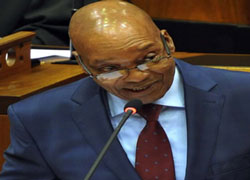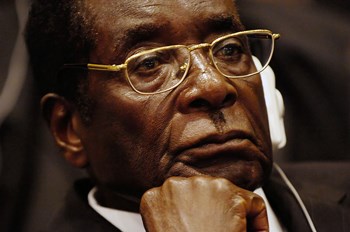Leaders of the forum say Africa must optimise its promising economic outlook that remains despite the economic turbulence affecting the global economy.
"An integrated Africa has a potential market of US $2.6trn. A prosperous and growing African economy is good for our continent's development. It also offers many opportunities for mutually beneficial trade and investment partnerships between our two countries," said President Jacob Zuma on Thursday during an address at the forum.

He underscored the view that the time is right for investors to turn to Africa as the next growth frontier.
"There is no stronger case for intra-Africa trade and diversifying away from the export of raw materials than the recent global financial crises and the declining oil prices."
All of these, he said, have decreased African export revenues generated from Western markets.
However, intra-regional trade and sustained growth on the continent must be preceded by enabling technical and transport infrastructure.
To address this challenge, various African countries have already signed the Tripartite Free Trade Area (T-FTA) to create fertile ground for more meaningful intra-Africa trade.
Zuma said one notable initiative already launched under the arrangement is the Tripartite North-South Corridor Investment Programme, which is being funded from the African Development Bank and the Development Bank of Southern Africa.
The programme aims implement an economic corridor-based approach to trade facilitation and reduction of costs of cross-border trade in sub-regions. The North-South Corridor Initiative will service eight countries - Tanzania, the DRC, Zambia, Malawi, Botswana, Zimbabwe, Mozambique and South Africa.
The South Africa-Zimbabwe Business Forum was attended by business leaders and investors from both countries.
The forum, held in Pretoria, formed part of Mugabe's two-day state visit to South Africa.
The forum was oversubscribed, showing a clear keenness among investors from both countries.
Due to the historical economic relations between the two countries, a number of South African companies continue to operate in Zimbabwe principally in the mining, tourism, agriculture, banking and retail sectors.
These include Nedbank, Impala Platinum, Standard Bank, Old Mutual and Tongaat-Hulett among many others.
This led to foreign direct investment (FDI) by South African entities in Zimbabwe between 2003 and 2013 being approximately R12.8bn. This created more than 2400 employment opportunities.
Between 2005 and 2014, South Africa's exports to Zimbabwe grew by 247% from R7.1bn to R24.8bn, with minimal contraction recorded in 2006 and 2009.
In the same period, Zimbabwean exports to South Africa fell by 54.7% to R2bn from the R4.4bn that was reported in 2005.

Mugabe has blamed this trend on Zimbabwe's sanctions, saying: "It is in our mutual interest to restore equal partners in our bilateral trade."
Traditionally, South Africa's exports to Zimbabwe comprise machinery, electrical equipment, mechanical appliances, chemical products, base metals, mineral products and agro-processed products. Zimbabwe's exports to South Africa include textiles, pearls, precious and semi-precious stones as well as base metals and mineral products.
But the two countries have now identified opportunities in the fields of mining, water, energy, infrastructure development, transport, information communication technologies, clothing and textile, financial services and pharmaceuticals, which remain untapped.
On Wednesday, the two countries signed five bilateral agreements to give impetus to the exploration of opportunities in these fields.
"Our two countries have an opportunity to capitalise on our abundant natural resources. In so doing, we can promote economic transformation through commodity-based industrialisation," Zuma told business.
By working together, Zuma believes that both countries can contribute meaningfully to Zimbabwe's Agenda for Sustainable Socio-Economic Transformation.
Zuma assured business leaders that the two governments would do everything possible to remove all the hindrances, perceived or otherwise, to allow for more investment.
"We are prepared to do everything possible to create an environment that is conducive for investment."
However, he said business also needs to play its part by ensuring that such investment leads to meaningful jobs for the people in order to improve quality of life.
"Business must raise their voices more clearly, more loudly, so we can change Africa as a continent."
He urged young people from both countries to use the opportunities to bring about economic freedom and empower the two countries economically.
" ... Economic transformation is urgent, important and correct," he said.
Mugabe said Africa must start to truly realise the benefits of freedom and independence.
"Independence is only a half measure in many African countries. They don't control their resources," he said.
He said land must produce for everyone and not only for a select few.
"We did not just fight for the vote. We fought for you to have freedom to use natural resources as assets in business. As such, we can no longer be exporters of primary commodities. Most in Africa... are exporting raw materials."
Despite the opportunities for growth that Zimbabwe offers for South African companies, investors in the mineral-rich southern African country have complained of the country's indigenisation policy.
Mugabe assured businesses that Zimbabwe is open for business.
"Contrary to media reports, security of investments in Zimbabwe is guaranteed in law and practice. We never nationalised private assets," he said.
He said his government was sticking to its indigenisation policy but said the 51% that foreign companies should cede to black Zimbabweans was negotiable, although this flexibility was not applicable for the mining sector.
In turn, business representatives from both countries, such as Business Unity SA (BUSA) and Zim Asset, committed to effectively exploring the untapped trade relations for the betterment of both economies.
SAnews.gov.za is a South African government news service, published by the Government Communication and Information System (GCIS). SAnews.gov.za (formerly BuaNews) was established to provide quick and easy access to articles and feature stories aimed at keeping the public informed about the implementation of government mandates.
Go to: http://www.sanews.gov.za